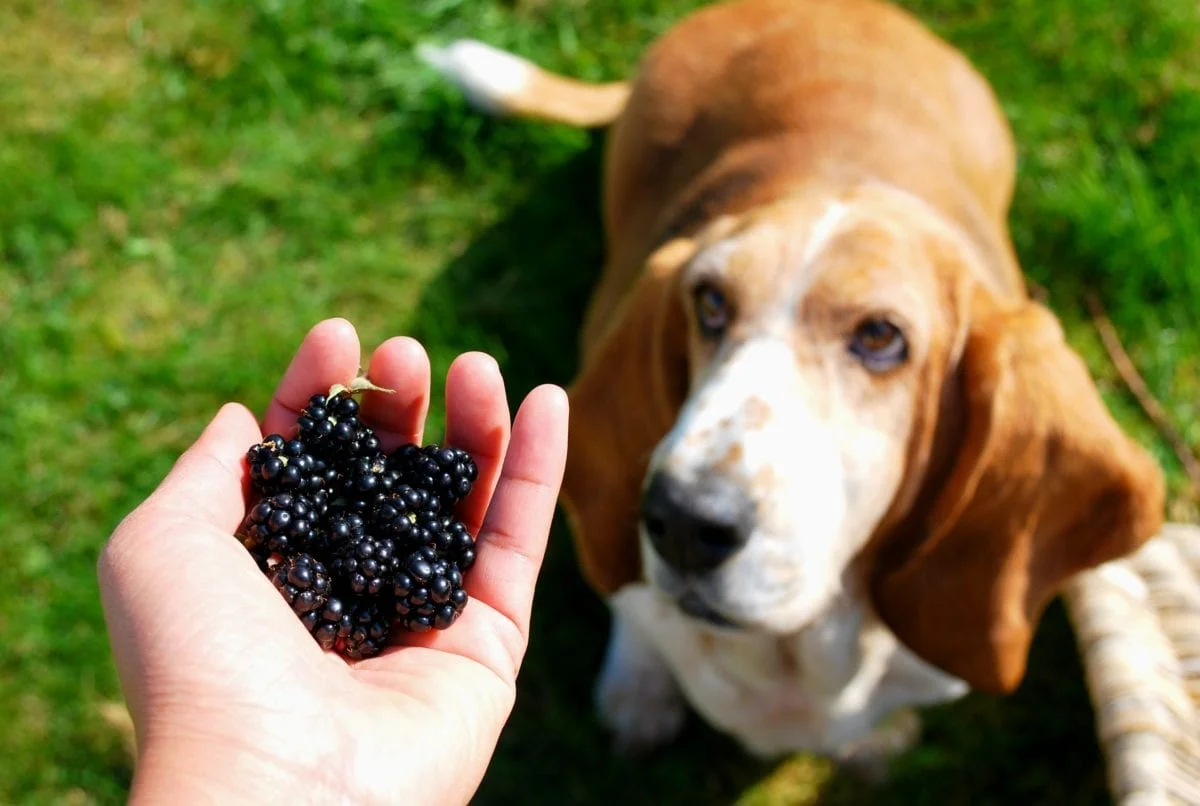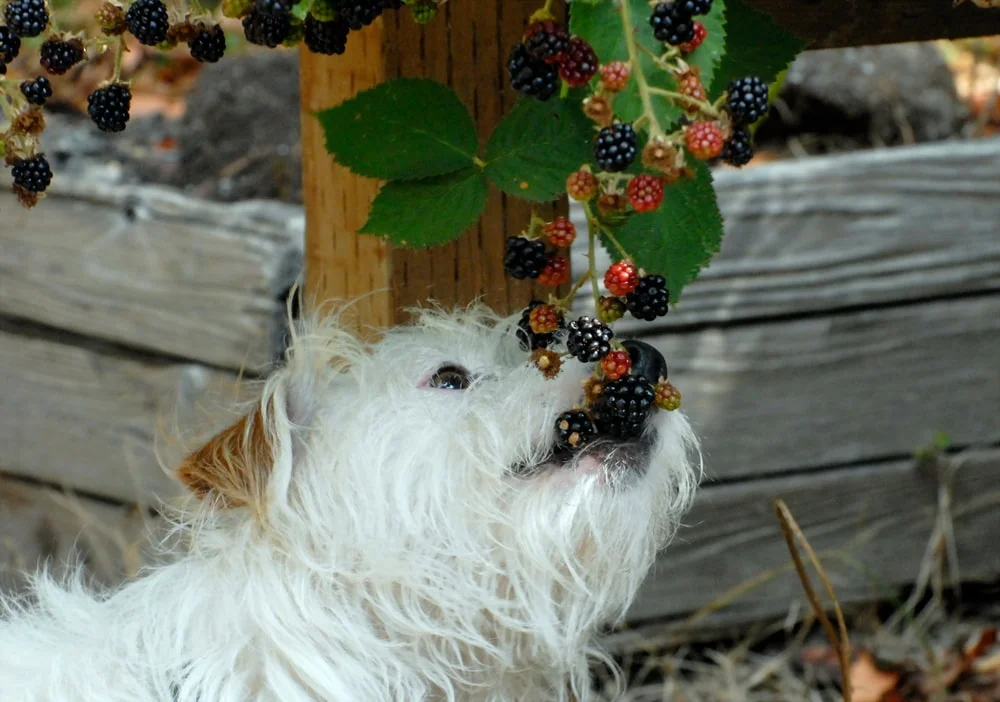PET HEALTH
Can Dogs Eat Blackberries? A Beneficial, Bite-Sized Treat
Blackberries are popular because they are delicate, tart, and sweet. This fruit is an excellent addition to any human recipe, like a morning parfait or a pie for your evening get-together with friends. But can dogs eat blackberries so they’re not left out of the fun? The short answer is yes! While you should still consult with your veterinarian, dogs can safely eat blackberries and reap the nutritional benefits from this small, antioxidant-packed fruit.
Are Blackberries Safe for Dogs?
Most berries are safe for dogs to eat, including blackberries. This isn’t across the board, though, as some berries like holly, juniper, and gooseberries are toxic.2 These sorts of berries are popular during the fall and winter months. Be wary of letting your dog munch on bushes during walks since it may be difficult to tell the difference between safe and toxic berries.3 If you are uncertain about introducing this fruit to your dog, ask your veterinarian beforehand, and be sure you’re giving your dog blackberries as opposed to another berry.
Blackberries’ Health Benefits
Blackberries, like raspberries and strawberries, are low in sugar. Best of all, most dogs love the taste! They’re sweet when ripe and can replace some of your pet’s higher-calorie treats. This beautiful combination makes these tiny morsels great go-to snacks for your dog.
A few benefits of blackberries include:2
● Fiber: Blackberries contain large percentages of fiber that may prevent constipation.
● Omega-3: In fish and fruits, omega-3 is a fatty acid that can keep your dog’s coat shiny and teeth healthy.
● Antioxidants: Anthocyanins, an excellent antioxidant, are colorful pigments that give the blackberry its inky sheen.4 Antioxidants neutralize the effects of inflammation in your dog’s body by combating free radicals in the environment.5 Plus, they improve brain function and reduce the risks of certain types of cancer.
● Vitamins: The vitamins in these berries — including vitamins A, B, C, E, and K — can enhance your dog’s immune system and increase their metabolism.6
How To Feed Blackberries to Your Dog
There are many fun ways to introduce blackberries into your dog’s diet. Let your dog enjoy this sweet treat straight from your hands — after washing the fruit, of course! Your pup may enjoy blackberries stuffed into a feeding toy with pieces of kibble and non-fat cream cheese. You could also just simply toss the fruit around the room for them to chase. Get creative! Any time spent keeping your dog active and stimulated is worthwhile.
How many blackberries can my dog eat?
Veterinarians recommend that treats make up only 10% of your dog’s daily calories. The number of blackberries you feed your dog may depend on their size. A good rule of thumb might be 6 – 8 blackberries for large dogs, while a smaller dog may have 1 – 2 blackberries.
Start with just one small blackberry to see how well your dog responds. Remember that fruit sugar is still sugar — negative side effects from consuming too much sugar include upset stomach or diarrhea. Moderation is key in preventing weight gain or other health concerns. If your dog has kidney issues or diabetes, avoid sweet fruits altogether and talk to your veterinarian about a more suitable treat.
Can my dog eat blackberry yogurt?
Unless they’re lactose intolerant, plain yogurt by itself isn’t harmful to dogs. Mix the fruit with a spoonful of non-fat plain yogurt to avoid exposing your pet to toxins.
What may come as a surprise is that blackberries contain a small amount of xylitol. Blackberry yogurts may contain xylitol as an artificial sweetener. If consumed in large amounts, xylitol damages the liver and drops your dog’s blood sugar level resulting in life-threatening hypoglycemia.7 Talk with your vet if there are concerns that your dog consumed artificially sweetened yogurt.
Can my dog have blackberry pie?
Generally speaking, dogs should not have pie. There are ingredients in pie that may be fatal to your dogs, such as cinnamon and nutmeg.8 However, don’t panic if your dog swipes a piece of blackberry pie off your plate. There probably isn't enough cinnamon, nutmeg, or xylitol to cause concern in one slice of pie. Simply monitor your dog for signs of an allergic reaction. If you notice your pup feeling sickly, take them to your vet.
When shouldn’t I give my dog blackberries?
Like us, some dogs are allergic to certain foods and plants.9 Things happen. Sometimes, though, a bad reaction may not be the result of the blackberry itself but the chemicals or pesticides used on it. Always wash fruit before sharing with your pup. If the fruit appears moldy, toss it! Moldy blackberries may contain harmful mycotoxins, resulting in vomiting, tremors, or death.10
Exploring options for a dog insurance policy through MetLife Pet¹ could help with the cost of some expenses should your pet be exposed to allergens.
Blackberries Are Safe for Dogs in Moderation
You can feel good knowing your dog can eat blackberries, just like many fruits and veggies we enjoy at our dinner tables. In moderation, blackberries can provide wonderful nutrients and fiber to your dog’s daily diet. Ensure the blackberries are clean and avoid letting your dog indulge in blackberry pastries or sweets made with artificial sweeteners. Having MetLife Pet's dog insurance can provide pet parents with peace of mind if they get into things they shouldn’t.


